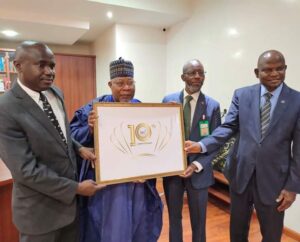
Islamic Banking was born in the early twentieth century. The foundation for what would become modern Islamic Banking began with trade activities conducted in Mecca and Medina. Some of these activities continued even after Islam became rooted in Mecca.
Islamic economic principles offers a balance between extreme capitalism and communism. The introduction of Islam eradicate riba institutions and practices, gharar transactions while institutionalizing fair and equitable markets without monopoly and fraud. Money and commodity exchanges standardization is based on the six commodities. Which are islamization of many business organizations and institutions with introduction of Mudarabah, musyarakah, salam, muzara’ah (sharecropping or partnership in agriculture), musaqah (irrigation). Later, new organizations and institutions were introduced for example Zakah, waqf and manihah, Baitul-mal.
Today, this financial system is been practiced in the most advance jurisdictions of the world and has been proved to be viable and had contributed immensely to the socio-economic development of these countries, when the system is properly regulated and given the adequate enabling environment to operate. Many Nigerians and indeed people all over the world are just getting to hear about Non-interest Finance, though it appears to have been anchored on Non-interest Banking already gaining grounds in the public space.
Due to the heterogeneous and the ethnoreligious nature of Nigeria as a country. The licensing of Non-interest Banking, by the Central Bank of Nigeria as an alternative banking system to complement the conventional banking system generated heated debate among Nigerians before now. Despite Nigeria’s demographic composition and increasing demand for Islamic finance, Nigeria’s fast-growing Islamic finance assets remain largely insignificant in the over USD$2 trillion Islamic finance global market, beckoning for significant financial sector reforms that will bolster the growth and penetration of Islamic finance and deliver overall economic growth. One of the impediments to the development of Islamic finance is the notion that Islamic finance is just for Muslims, an expert noted.
Moreover, Islamic banks typically, do not give out loans except under an interest-free loan arrangement for social solidarity or very micro businesses. Non-interest Banks engage in partnership contracts, trading contracts, leasing contracts, and other financial services that conform to Islamic commercial jurisprudence. Islamic financial products have played a critical role in the growth and development of the Nigerian capital market ecosystem. The critical success factors for establishing Non-interest Banking in Nigeria, are promotion and collaboration between stakeholder agencies, finance ministry officials, judiciary and securities industry regulators to develop a robust framework.
One of the best performing banks and the first Non-Interest Bank in Nigeria, Jaiz Bank PLC commenced operation on the 6th of January 2012 on a foundation of trust, professionalism and excellence to deliver innovative financial solutions and exceptional customer experience. The Bank opened its doors to customers with a Regional License obtained from the Central Bank of Nigeria to operate in the Northern part of the country and thereafter metamorphosed into a National Bank on the 12th of May 2016 with key presence in virtually all geopolitical zones of the country.

Hassan Usman, Managing Director/CEO of Jaiz Bank said,“Today, Jaiz Bank officially clocks ten years since it first opened its doors to customers on the 6th of January 2012. The journey was much like a roller coaster – you experience some degree of fear at the onset, but subsequently excitement takes over when the carriage takes off and you feel that euphoria of defying the odds of gravity.”
The Bank is publicly quoted on the Nigerian Stock Exchange (NSE) with a balance sheet size of N233 billion (as at December 31st 2020) from N12 billion in 2012. Financing and Investment assets also grew from over N30 billion in 2012 to N166billion (as at December 31st 2020). Other critical parameters such as customer deposits, branch network and profitability have all been growing year–on–year since inception.
Jaiz Bank has made remarkable impact in empowering women, driving financial inclusion and supporting various strata of businesses in the real sector of the economy, Agriculture, Real Estate, Construction, Oil & Gas, General Commerce, etc.
The Bank was rated by the Islamic International Rating Agency (IIRA), assigning it an investment grade rating of BBB. Most recently, the Bank also got an upgrade from both Agusto and GCR to BBB and BBB- respectively with stable outlook. Besides, Fitch also did its’ first rating of this promising institution, and it came out at the same impressive level.
In 2021, analysts at Nairametrics describe the Bank as the fastest growing among the listed banks in Nigeria (39.3% growth in Total Assets, based on December 2020 results) as well as the 4th most efficient based on Return on Equity (17.4%). Jaiz Bank ranks 36th on the World’s Strongest Islamic Banks as at 2021 ahead of much older institutions like the Islamic Bank of Bangladesh (42nd), Emirates Islamic Bank of UAE (49th) and HSBC Amanah of Malaysia (72nd), according to the international annual ranking by “The Asian Banker” (A Singapore-based leading provider of strategic intelligence on the financial services industry).
The 2021 Islamic Finance Development Report indicated that, “The global Islamic finance industry will continue to grow, with a total global asset value of $4.94 trillion expected by 2025, with Nigeria expected to play a major part in its growth.” Expert says, “We must establish comprehensive operational frameworks for Islamic financial products and services and improve awareness of these financing options to the real sector. Consequently, stakeholder engagement becomes imperative to enhance the soundness and efficiency in our financial system on Islamic finance, if we are to build a globally competitive economy.” The growing interest of investors and banks to establish Non-interest Banking in Nigeria will continue to support financial sector deepening; enhance product offerings; and increase enhance investment in the economy.



One comment on “Jaiz Bank, Non-Interest Banking in Nigeria: 10 Years On”
Shehu
March 4, 2022 at 5:54 amMorning
Please when will the Bank start operation in Minna?
During your visit to governor the management said within 30 days and now we’re in 2022 which is more than 3 Months.